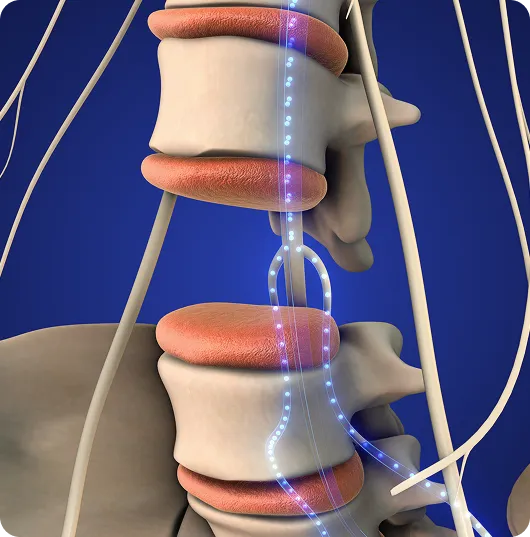Axonics Therapy at NW Continence
Advanced relief for bladder and bowel control issues

What Is Axonics Therapy?
Axonics Therapy is a minimally invasive treatment that uses gentle electrical stimulation to regulate the sacral nerves, the nerves that control bladder and bowel function. These nerves play a key role in how your brain communicates with the muscles that store and release urine and stool. When that communication is disrupted, symptoms like urgency, leakage, or retention can occur.
Axonics Therapy offers long-lasting relief from:
Overactive bladder (OAB)
Urinary retention
Urinary and bowel incontinence
When conservative treatments like medications, exercises, or lifestyle changes aren’t enough, Axonics Therapy provides a powerful, targeted solution to restore control and improve quality of life.
What Is Axonics Therapy?
Axonics Therapy is a minimally invasive treatment that uses gentle electrical stimulation to regulate the sacral nerves, the nerves that control bladder and bowel function. These nerves play a key role in how your brain communicates with the muscles that store and release urine and stool. When that communication is disrupted, symptoms like urgency, leakage, or retention can occur.
Axonics Therapy offers long-lasting relief from:
Overactive bladder (OAB)
Urinary retention
Urinary and bowel incontinence
When conservative treatments like medications, exercises, or lifestyle changes aren’t enough, Axonics Therapy provides a powerful, targeted solution to restore control and improve quality of life.

How Does It Work?
Understanding Sacral Neuromodulation
Axonics Therapy is based on sacral neuromodulation (SNM), a proven technique that restores communication between the brain and pelvic organs.
The sacral nerves, located in the lower spine, send and receive messages related to bladder and bowel function. Axonics stimulates these nerves with controlled electrical signals, helping to normalize reflexes and restore control.
Unlike medications that only treat muscle symptoms, SNM targets the nervous system, offering a deeper and more lasting solution.
Why Choose Axonics Therapy?
Axonics Therapy stands out as a modern, patient-friendly solution for managing incontinence. Unlike traditional methods, it targets the source of the problem: nerve communication, offering reliable, long-lasting results with minimal disruption to your life.
✔ Long-Term Results – Up to 15 years of symptom relief.
✔ Minimally Invasive Procedure – Quick, outpatient surgery.
✔ Rechargeable System – Small device with monthly wireless charging.
✔ FDA Approved – Safe and effective for both urinary and bowel conditions.
At Northwest Continence Center, we specialize in Axonics Therapy and tailor every treatment to your individual needs.
The Axonics System
Axonics Therapy is built around a compact and user-friendly system designed to make long-term symptom relief as seamless and convenient as possible. Unlike older neuromodulation devices, the Axonics System prioritizes patient comfort, mobility, and ease of use, without compromising effectiveness.
Here’s what it includes:
Miniature Implant Device
A small, rechargeable neurostimulator is implanted just under the skin in the upper buttock area. Despite its size, it delivers powerful and precise stimulation to the sacral nerves responsible for bladder and bowel function.
Wireless Charging System
The device is recharged wirelessly, typically for about one hour per month. The charging process is straightforward and can be done while relaxing at home, without disrupting your routine.
User-Friendly Remote Control
Patients receive a handheld remote that allows them to easily adjust settings if needed. The remote is intuitive, one-handed, and never needs to be recharged.
Together, these components provide greater freedom, fewer disruptions, and long-term relief without the frequent surgical revisions often required by older treatment systems.
What to Expect from the Procedure
Axonics Therapy is performed using a minimally invasive outpatient technique. Our surgeons, Dr. Robert Heros and Dr. Jason Anderson, are highly experienced in neuromodulation and spine procedures.
With precision and care, the device is implanted in the lower back area, ensuring optimal placement and minimal downtime.
Referral Process
Healthcare professionals—including urologists, urogynecologists, gastroenterologists, and primary care providers—can refer patients for Axonics Therapy through our online referral form.
We’ll take care of the rest, ensuring a smooth and coordinated experience for both the patient and referring provider.

Is Axonics Therapy Right for You?
Axonics Therapy may be effective if you suffer from:
Frequent urination or strong, sudden urges (OAB)
Urinary incontinence (leakage)
Bowel incontinence (inability to control stool)
Non-obstructive urinary retention
Read More About Axonics Therapy vs. Conservative Treatments
Who May Not Be a Candidate?
This therapy is not recommended for patients who:
Have stress incontinence as the primary issue
Have urinary symptoms caused by obstruction (e.g., enlarged prostate, cancer)
Live with advanced neurological conditions (e.g., MS, diabetes)
Have cognitive impairments that limit their ability to manage the system
Are pregnant or pediatric patients
Is Axonics Therapy Right for You?
Axonics Therapy may be effective if you suffer from:
Frequent urination or strong, sudden urges (OAB)
Urinary incontinence (leakage)
Bowel incontinence (inability to control stool)
Non-obstructive urinary retention
Read More About Axonics Therapy vs. Conservative Treatments
Who May Not Be a Candidate?
This therapy is not recommended for patients who:
Have stress incontinence as the primary issue
Have urinary symptoms caused by obstruction (e.g., enlarged prostate, cancer)
Live with advanced neurological conditions (e.g., MS, diabetes)
Have cognitive impairments that limit their ability to manage the system
Are pregnant or pediatric patients

Why Patients Trust Northwest Continence Center
We take a science-based, compassionate approach that puts your comfort and results first.
Advanced Axonics Therapy
A minimally invasive solution that restores nerve communication for lasting relief.
Personalized, Science-Based Care
Every treatment plan is tailored to your unique needs using proven medical approaches.
Experienced, Specialized Providers
Our experts are trained in continence-focused procedures and neuromodulation techniques.
Judgment-Free Patient Support
We create a respectful, compassionate environment where you feel safe and heard.
We’re More Than Just a Clinic
We understand that incontinence can be emotional and isolating. That’s why we’re committed to making your experience safe, respectful, and empowering. Every visit is designed to make you feel heard and supported.

Let’s find the right solution together.